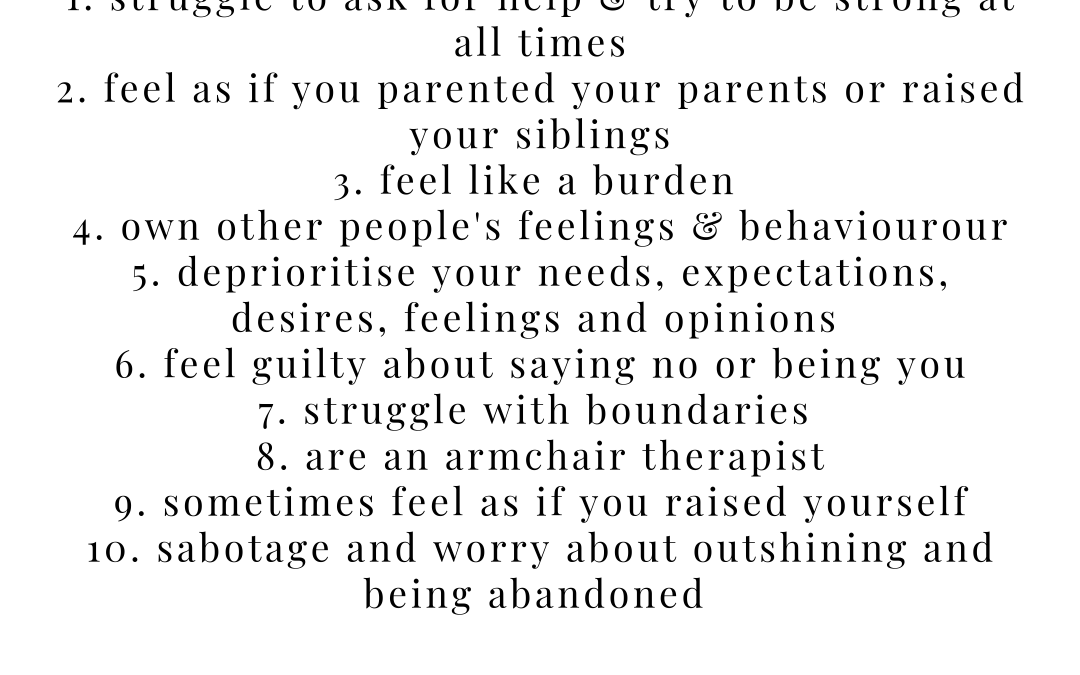In this week’s episode of The Baggage Reclaim Sessions, I talk about recognising how over-responsibility shows up in your life and how this can help you to have more self-compassion and the bandwidth to take care of you.
Subscribe on Apple Podcasts | Spotify | Android
Some nuggets from the episode
If you wonder why you…
- Struggle to ask for help or try to be strong all the time
- Feel as if you parented your parents or raised your siblings
- Feel like a burden
- Are lost and don’t know yourself
- End up doing the equivalent of trying to row a boat with one oar in your relationships
- Own other people’s feelings and behaviour
- Deprioritise your needs, expectations, desires, feelings and opinions
- Feel guilty about saying no or being you
- Struggle with boundaries
- Are an armchair therapist
- Sometimes feel as if you raised yourself
- Act as if you don’t have any needs
- Self-sabotage and worry about outshining or being abandoned
… it’s because you’ve learned to be over-responsible.
- Sometimes parents or other authority figures (or people who we assumed were authorities) gave us responsibilities. And sometimes we assumed responsibility where we didn’t have it.
- There are painful yet remarkably quick ways that we make a decision that marks the beginning of a lifelong pattern of over-responsibility. We see our parents working hard and figure, for example, that it’s best not to mention the horrible thing we’re going through.
We become over-responsible in an attempt to ‘help out’ and ‘be good’.
- Some of our attitudes include: Be seen but not heard. Don’t ask for too much. Don’t be demanding or make waves. Hang back. Be the fixer. Solve mommy/daddy’s/the family’s problems.
- Over-responsible people also over-function in their interpersonal relationships.
- Deep down, we know that a lot of the stuff that we say is ours is not our stuff.
- When someone doesn’t look happy, or they’re not in the typical mood associated with them, an over-responsible person will wrack their brains trying to figure out what they did, or they will try to fix the person’s mood. They assume they’re responsible even though they’re not.
It’s great to be conscientious and thoughtful. Where it becomes a problem is when we can’t be these for ourselves.
- Sometimes we’re over-responsible because we were, for example, treated as if we were an extension of a parent. Next thing, we don’t have an identity, we think that being an extension is how to be loved, and we believe we’re responsible for their moods and behaviour.
- Re-look at your life through the lens of over-responsibility. How do past events look? Are you able to view you differently?
- If you wouldn’t give a loved one or a small child the same responsibility, you need to recognise where you’re being grossly unfair to your current and younger self.
- When you increase awareness of your genuine responsibilities, you can make better decisions.
Links mentioned
- Giving up roles (ep. 128)
- Jamelia’s The Table episode about mental health and black women
- More about giving up the role of being over-responsible
- Podcast episode about being over-responsible
Please subscribe and/or leave a review on iTunes (how-to guide here) – it really helps in growing the show! If you’re new to podcasts, find out more about what they are and how to subscribe with this guide.
Listener questions can be emailed to podcast AT baggagereclaim DOT com and if there’s a topic you’d love me to talk about, let me know!
Nat xxx

 Add to favorites
Add to favorites


Yes to at least a few of these – I feel like I raised myself, don’t often ask for help/support, and when someone seems to be upset/angry, I start wondering what I’ve done to cause their feelings.
For the last of these, I actually didn’t realise that this wasn’t the normal thing to do until quite recently (and I still don’t fully believe it). Surely if someone is suddenly acting like they’re angry, it’s for some reason, right? My parents never discussed things, and my Mum often went silent when she was angry/upset, so the only way to try to figure out what was going on was my running through all the possibilities in my mind and trying to sort out what the issue could be.
I also had a terrible ex who broke things off and then strung me along with mixed messages. I knew he wouldn’t have a real conversation about things, and I was constantly trying to figure out what was going on, what he was thinking, feeling, etc. Ugh, so much energy wasted when obviously the sh*t way he was treating me spoke for itself.
On feeling responsible for others’ feelings, I notice that if my boyfriend starts to seem upset about something, I feel like I need to cave and do or not do something, depending on the situation. I think I have a bit of a sense of panic when someone starts to get angry and I feel like I have no choice but to go along. I’m not sure why, but suspect it may be b/c my Dad’s anger was always so erratic/crazy, and we were all conditioned to just walk on eggshells and never call him out on anything.
Brilliant episode Natalie. I’m really going to make an effort not to listen to my own personal “Vera”.